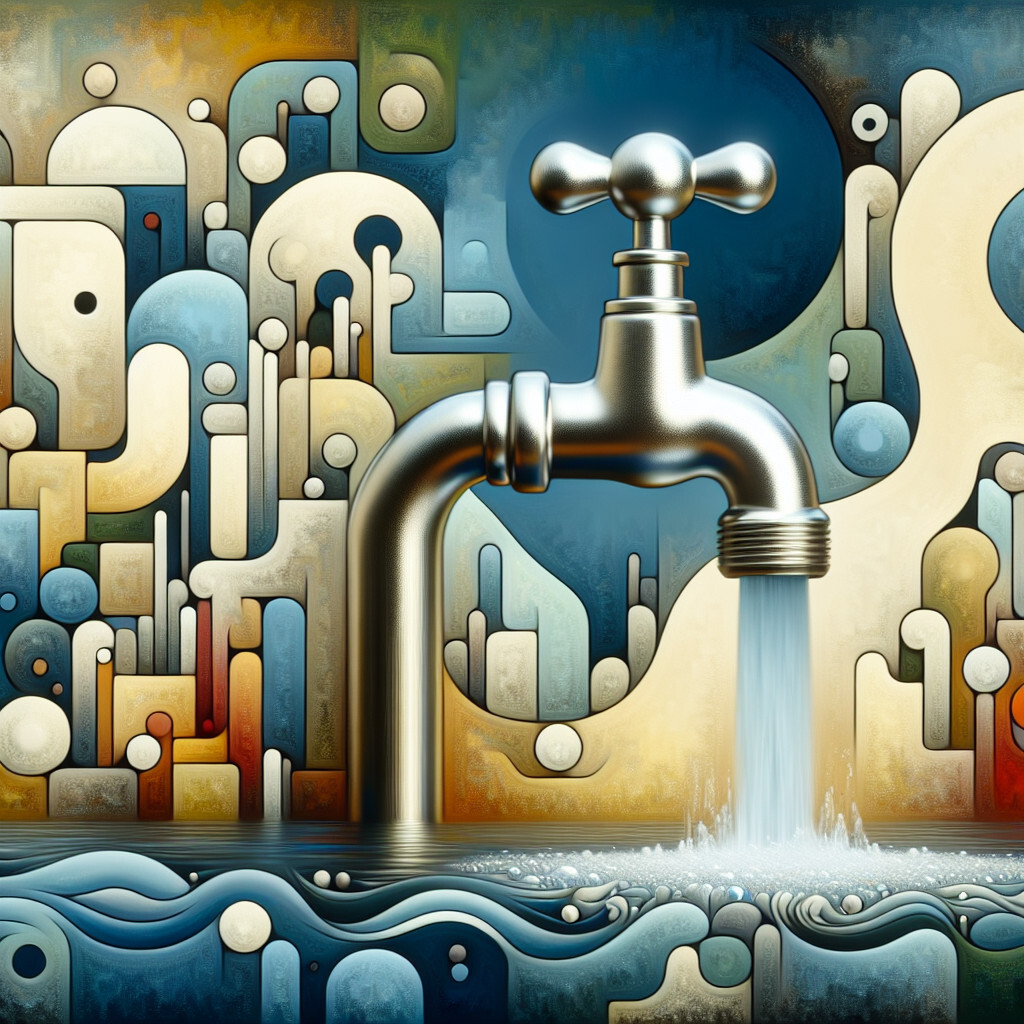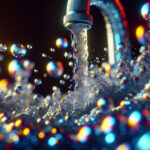-
Table of Contents
“UAE’s Tap Water: Clean, Safe, and Desalinated for Optimal Health.”
Introduction

The tap water in the United Arab Emirates (UAE) is generally safe to drink. It is produced through desalination, a process that removes salt and other impurities from seawater, making it fit for human consumption. However, due to the hot climate, water in the supply lines can heat up and may not be suitable for direct drinking. Therefore, many residents prefer to drink bottled water or install water filters at home. Despite this, the UAE government ensures that the water quality meets World Health Organization standards.
Understanding the Quality of Tap Water in UAE
The United Arab Emirates (UAE) is a country known for its rapid development and modern infrastructure. However, one question that often arises among residents and visitors alike is about the quality of tap water in the country. This article aims to provide an understanding of the quality of tap water in the UAE, based on scientific research and expert opinions.
The UAE, being a desert country, relies heavily on desalination plants for its water supply. These plants convert seawater into potable water, which is then supplied to households and businesses. The desalination process involves removing salts and other impurities from seawater, making it safe for consumption. The UAE has one of the largest desalination plants in the world, ensuring a steady supply of water to its residents.
However, despite the rigorous desalination process, many residents prefer to drink bottled water or install water filters in their homes. This preference is primarily due to the perception that tap water is not safe for drinking. But is this perception accurate?
According to the UAE’s Federal Authority for Nuclear Regulation (FANR), the tap water in the country is safe to drink. The FANR regularly tests the water for radioactive substances and has consistently found it to be within safe limits. Similarly, the Dubai Electricity and Water Authority (DEWA) also maintains that the tap water is safe for consumption. DEWA conducts regular tests to ensure the water quality meets the World Health Organization’s guidelines.
However, the taste of tap water can vary depending on the location and the condition of the water pipes in the building. In some older buildings, the pipes may be corroded, which can affect the taste and quality of the water. Therefore, it is recommended to regularly check the condition of the water pipes and replace them if necessary.
Another factor that can affect the taste of tap water is the temperature. In the UAE’s hot climate, the water in the pipes can become warm, which can alter its taste. This is one reason why many people prefer to drink chilled bottled water.
While the tap water in the UAE is generally safe to drink, it is important to note that individual sensitivities can vary. Some people may be more susceptible to the minerals present in the water, which can cause digestive issues. Therefore, if you have a sensitive stomach, it may be advisable to drink filtered or bottled water.
In conclusion, the tap water in the UAE is safe for consumption, as it undergoes rigorous testing to ensure it meets international standards. However, the taste and quality can vary depending on the condition of the water pipes and the temperature. Therefore, while it is safe to drink tap water, many residents prefer to use water filters or drink bottled water for taste reasons. As always, it is important to stay hydrated, especially in the UAE’s hot climate, whether you choose to drink tap water, filtered water, or bottled water.
The Process of Water Purification in UAE: Is Tap Water Safe?
The United Arab Emirates (UAE) is a country known for its vast deserts and high temperatures, making the availability of clean, safe drinking water a critical issue. The UAE has made significant strides in ensuring the provision of safe tap water to its residents. This article will delve into the process of water purification in the UAE and address the question: Is tap water safe?
The UAE primarily relies on desalination, a process that removes salt and other impurities from seawater, to meet its water needs. The country is home to some of the world’s largest desalination plants, which use advanced technologies to produce fresh water. The process begins with the intake of seawater, which is then pre-treated to remove large particles. The water is then subjected to reverse osmosis, a process that involves forcing the water through a semi-permeable membrane to remove smaller impurities, including salts. The water is then disinfected, usually with chlorine, to kill any remaining microorganisms, ensuring the water is safe for consumption.
The UAE’s commitment to providing safe drinking water is evident in its strict adherence to international standards. The country’s water quality is regulated by the UAE’s National Supervisory Committee, which ensures that the water produced by desalination plants meets the World Health Organization’s (WHO) guidelines for drinking water. These guidelines specify the maximum allowable concentrations of various substances in drinking water, including chemicals, bacteria, and viruses, to ensure the water is safe for human consumption.
Despite the rigorous purification process and strict regulations, many residents in the UAE prefer to drink bottled water or use water filters at home. This preference is largely due to misconceptions about the safety of tap water. However, several studies have shown that the tap water in the UAE is safe to drink. A study conducted by the Emirates Authority for Standardization and Metrology found that the tap water in all seven emirates met the WHO’s guidelines for drinking water. Similarly, a study by the Dubai Electricity and Water Authority found that the tap water in Dubai is safe to drink and meets all international standards.
However, it’s important to note that while the water leaving the desalination plants is safe, the quality of the water can be affected by the distribution system. The water can become contaminated if the pipes are old or not properly maintained. Therefore, it’s recommended to regularly check the condition of the pipes in your home and to clean water tanks regularly to ensure the water remains safe.
In conclusion, the tap water in the UAE undergoes a rigorous purification process and is subject to strict regulations to ensure it is safe for consumption. While the water leaving the desalination plants is safe, the quality of the water can be affected by the distribution system. Therefore, it’s important to maintain the condition of the pipes in your home and to clean water tanks regularly. Despite misconceptions, several studies have confirmed that the tap water in the UAE is safe to drink, making it a viable and environmentally friendly alternative to bottled water.
Comparing Bottled Water and Tap Water in the UAE
The United Arab Emirates (UAE) is a country known for its rapid development and modern infrastructure. However, one aspect that often raises questions among residents and visitors alike is the quality of tap water. In the UAE, the source of tap water is primarily desalinated seawater, which undergoes a rigorous purification process before it reaches the taps. Despite this, many people in the UAE prefer to drink bottled water, leading to a comparison between the two.
The UAE’s tap water is produced through a process called reverse osmosis, where seawater is forced through a semi-permeable membrane to remove impurities. This process is highly effective in removing contaminants, making the tap water in the UAE safe to drink. The water is then treated with a small amount of chlorine to kill any remaining bacteria or viruses, ensuring its safety. The UAE’s tap water meets the World Health Organization’s guidelines for drinking water quality, which is a testament to its safety and cleanliness.
However, despite the rigorous purification process and the fact that tap water in the UAE is safe to drink, many people still prefer bottled water. This preference is often driven by perceptions rather than facts. Many people believe that bottled water is cleaner and safer than tap water, even though this is not necessarily the case. In fact, some studies have shown that bottled water can contain more microplastics and other contaminants than tap water.
Bottled water in the UAE comes from various sources, including local wells and imported sources. While bottled water is also subject to strict quality controls, it is not necessarily superior to tap water. In fact, some brands of bottled water are simply treated tap water. Furthermore, bottled water is significantly more expensive than tap water, and its production and disposal contribute to environmental pollution.
The taste of water can also influence people’s preferences. Some people find that tap water in the UAE has a slightly salty taste due to the desalination process. On the other hand, bottled water often undergoes additional treatments to improve its taste, such as the addition of minerals. However, the taste of water can vary greatly depending on the source and the individual’s personal preference.
In conclusion, both tap water and bottled water in the UAE are safe to drink. The choice between the two often comes down to personal preference and perceptions. While bottled water may be preferred by some for its taste, it is not necessarily superior in terms of safety or cleanliness. Moreover, the environmental impact and cost of bottled water are significant considerations. Therefore, residents and visitors in the UAE can feel confident in drinking tap water, knowing that it is safe, clean, and a more sustainable choice.
Health Implications of Consuming Tap Water in the UAE
The United Arab Emirates (UAE) is a country known for its rapid development and modern infrastructure. However, one aspect that often raises questions among residents and visitors alike is the quality of tap water. The health implications of consuming tap water in the UAE are a topic of considerable interest and importance.
The UAE, being a desert country, relies heavily on desalinated seawater and underground water sources to meet its water needs. The process of desalination involves removing salt and other impurities from seawater, making it safe for human consumption. However, the process also removes essential minerals like calcium and magnesium, which are vital for human health. Consequently, the desalinated water, although safe to drink, may not provide the necessary minerals required by the human body.
Moreover, the water in the UAE is hard, meaning it has high mineral content, primarily calcium and magnesium. While hard water is not harmful to health, it can have a different taste and may cause minor skin irritations in some individuals. It’s also worth noting that the hardness of water can vary across different regions in the UAE.
Another concern is the potential for contamination during the distribution of water. While the desalinated water is initially pure, it travels through a network of pipes before reaching the tap. If these pipes are old or not well-maintained, they can introduce contaminants into the water. Additionally, the hot climate of the UAE can promote the growth of bacteria in water storage tanks, further increasing the risk of contamination.
Despite these concerns, it’s important to note that the UAE government takes water quality very seriously. The country has strict regulations in place to ensure the safety of its water supply. Regular testing is conducted to monitor the quality of tap water, and any issues are addressed promptly. Furthermore, the UAE is continually investing in new technologies and infrastructure to improve its water supply system.
However, despite these measures, many residents in the UAE prefer to drink bottled water or install water filters in their homes. Bottled water is perceived as safer and more convenient, while water filters can help to remove any potential contaminants and improve the taste of tap water. It’s also common for people to boil tap water before drinking it, as this can kill any bacteria or other microorganisms that may be present.
In conclusion, while the tap water in the UAE is generally safe to drink, it may lack essential minerals and have a different taste due to its hardness. There is also a potential risk of contamination during distribution, although the government takes stringent measures to ensure water quality. Therefore, while it’s safe to consume tap water in the UAE, many people choose to drink bottled water or use water filters for added peace of mind. As always, it’s important to stay informed about water quality in your area and take appropriate measures to ensure your health and wellbeing.
Q&A
1. Question: Is tap water in the UAE safe to drink?
Answer: Yes, the tap water in the UAE is safe to drink as it meets the World Health Organization standards. However, many residents prefer to drink bottled water due to taste preferences.
2. Question: What is the source of tap water in the UAE?
Answer: The tap water in the UAE is primarily sourced from desalinated seawater. The country has one of the largest desalination plants in the world.
3. Question: Does the tap water in the UAE contain any harmful substances?
Answer: The tap water in the UAE is regularly tested and is free from harmful substances. It meets the World Health Organization’s guidelines for drinking water quality.
4. Question: Why do some people in the UAE prefer bottled water over tap water?
Answer: Some people in the UAE prefer bottled water over tap water due to taste preferences and perceptions about its quality and safety, even though the tap water is safe to drink.
Conclusion
The tap water in the UAE is generally safe to drink as it meets the World Health Organization standards. However, due to the hot climate, there can be issues with storage and distribution that may affect the taste and quality. Therefore, many residents prefer to drink bottled or filtered water.






